Unit 2 Neighbours Grammar 课件(共38张PPT)
文档属性
| 名称 | Unit 2 Neighbours Grammar 课件(共38张PPT) | 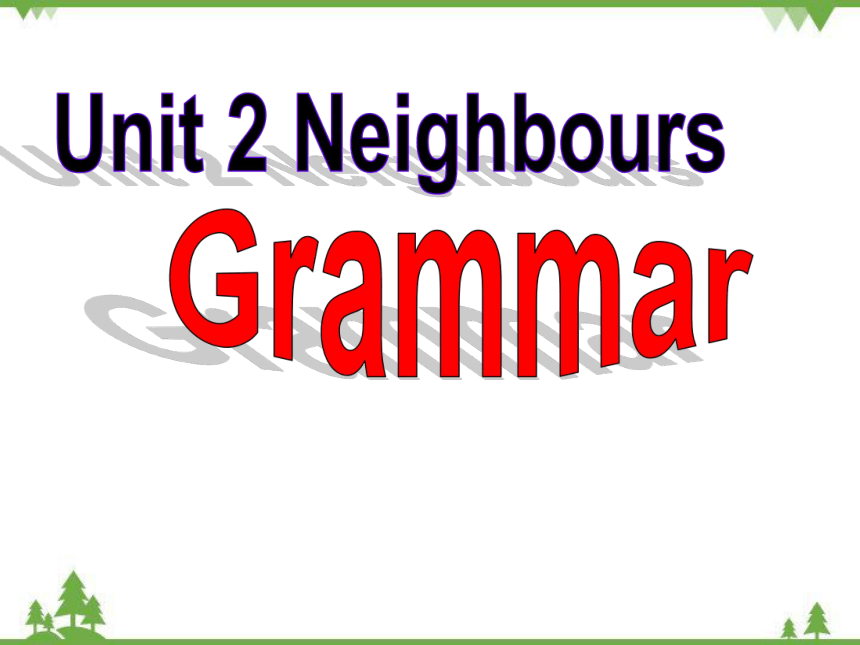 | |
| 格式 | ppt | ||
| 文件大小 | 3.6MB | ||
| 资源类型 | 教案 | ||
| 版本资源 | 牛津译林版 | ||
| 科目 | 英语 | ||
| 更新时间 | 2022-05-20 09:43:01 | ||
图片预览

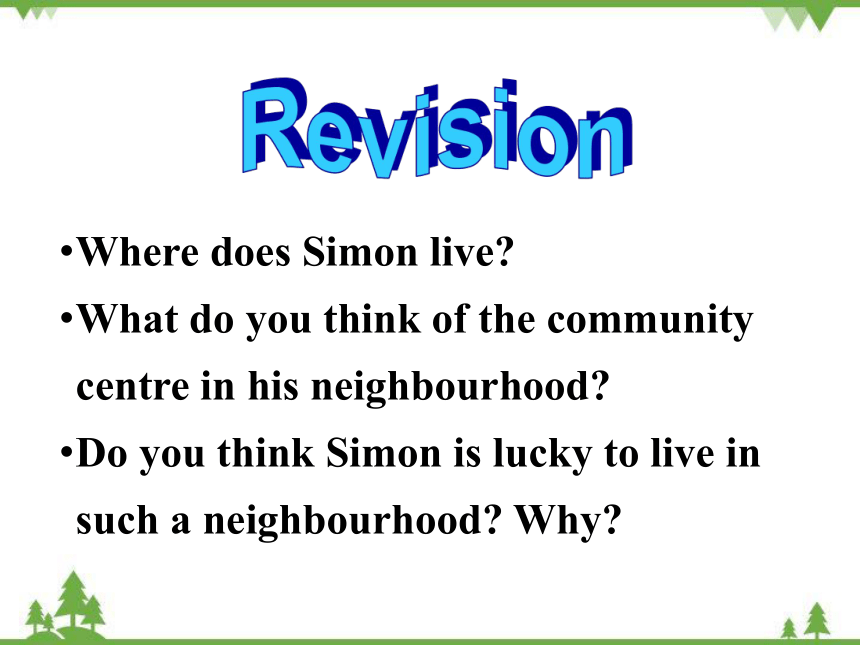
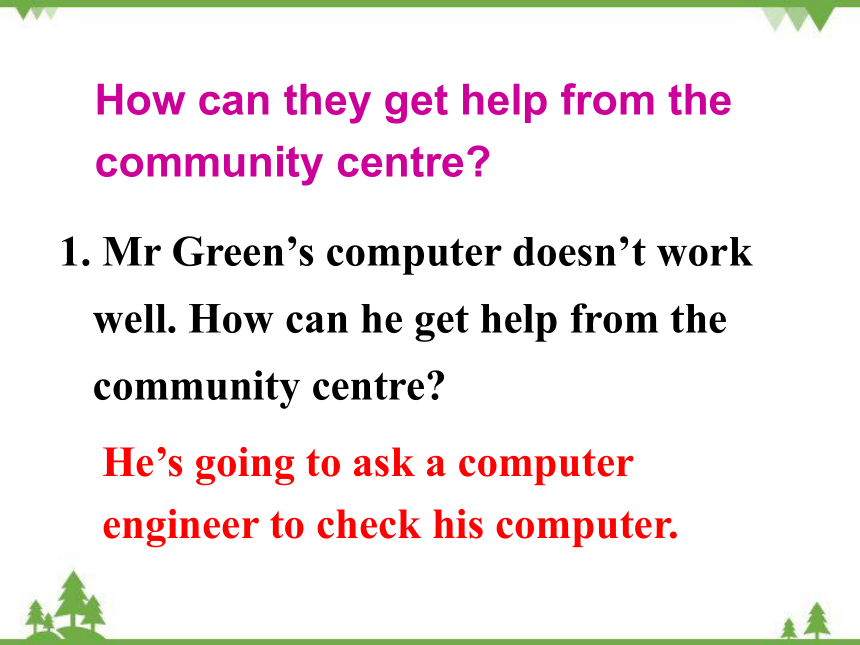
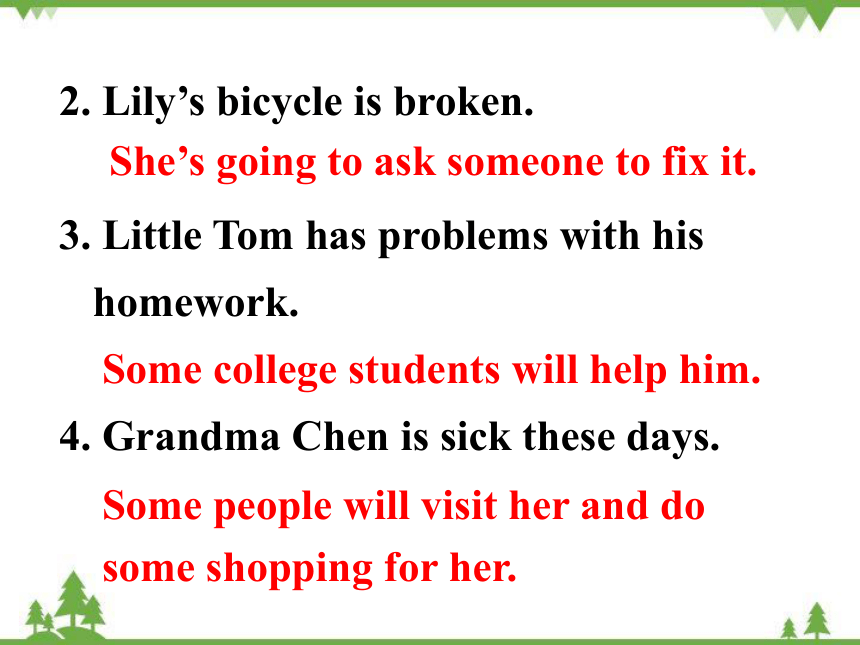
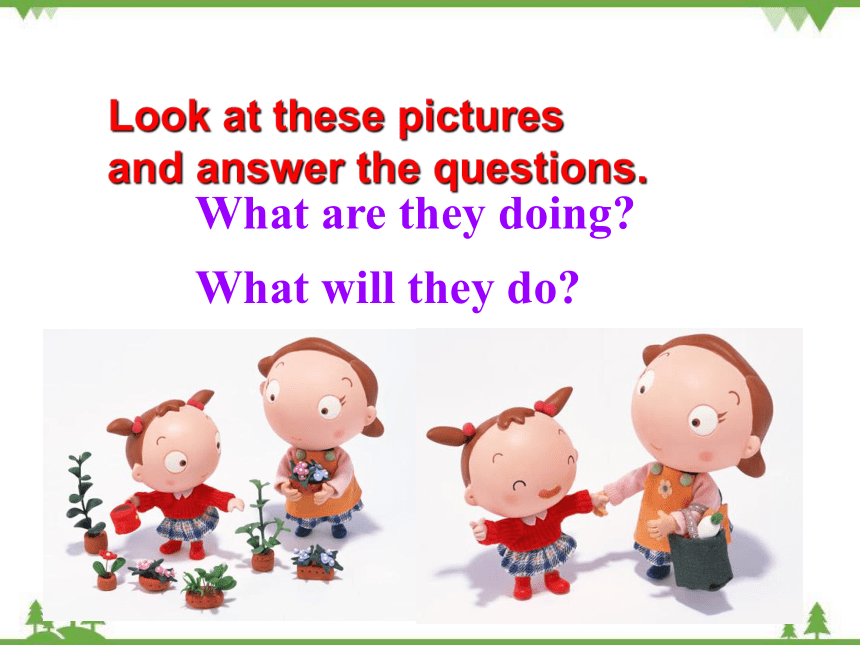
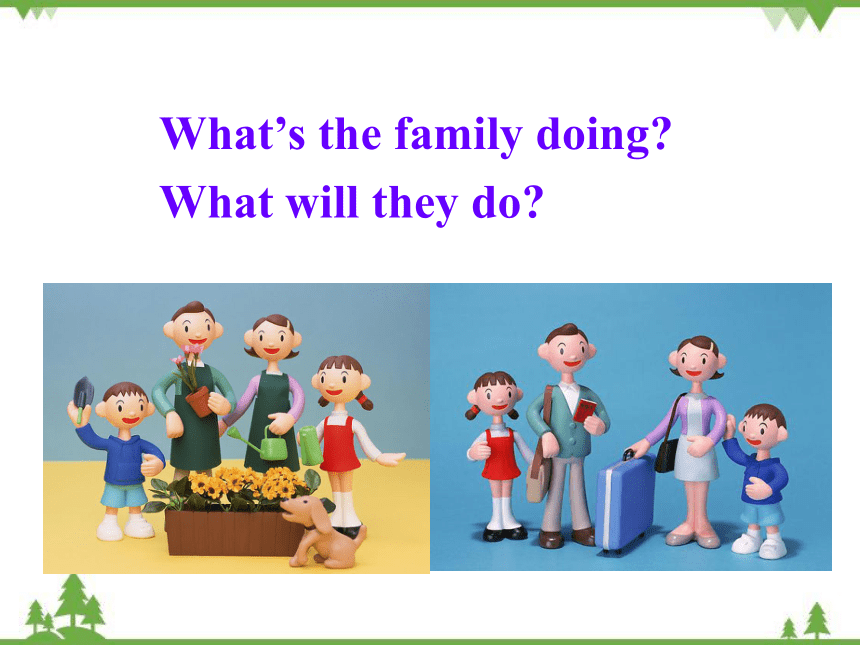
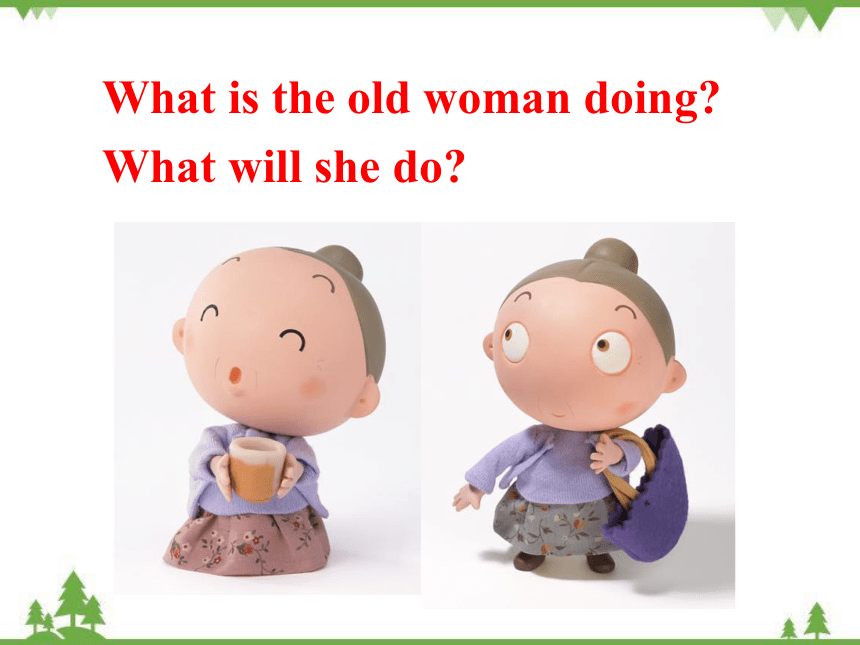
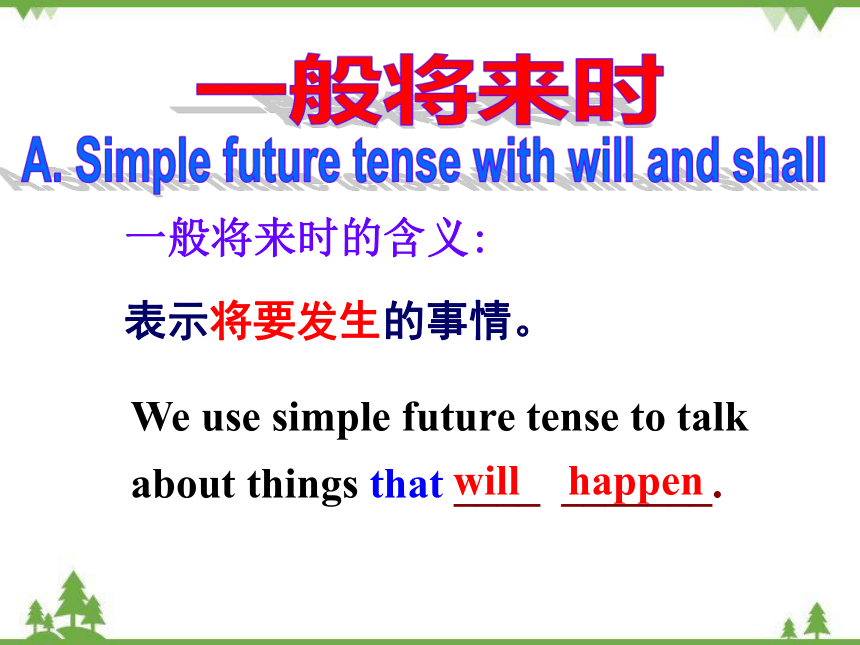

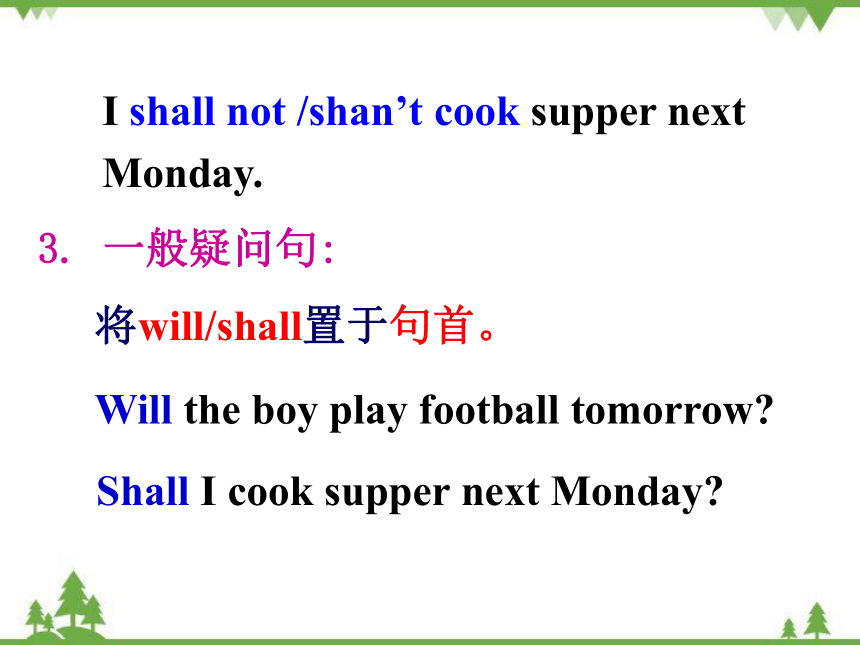
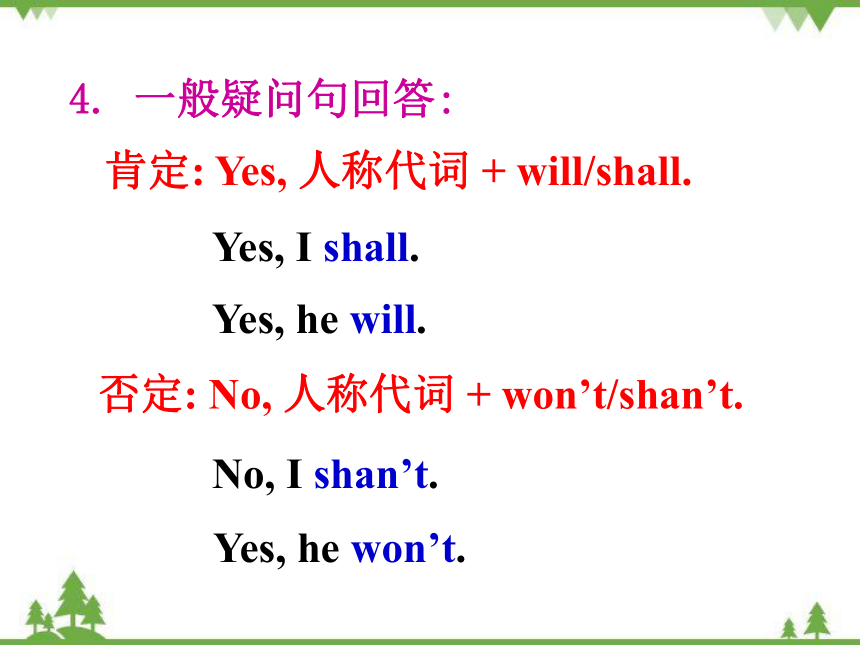
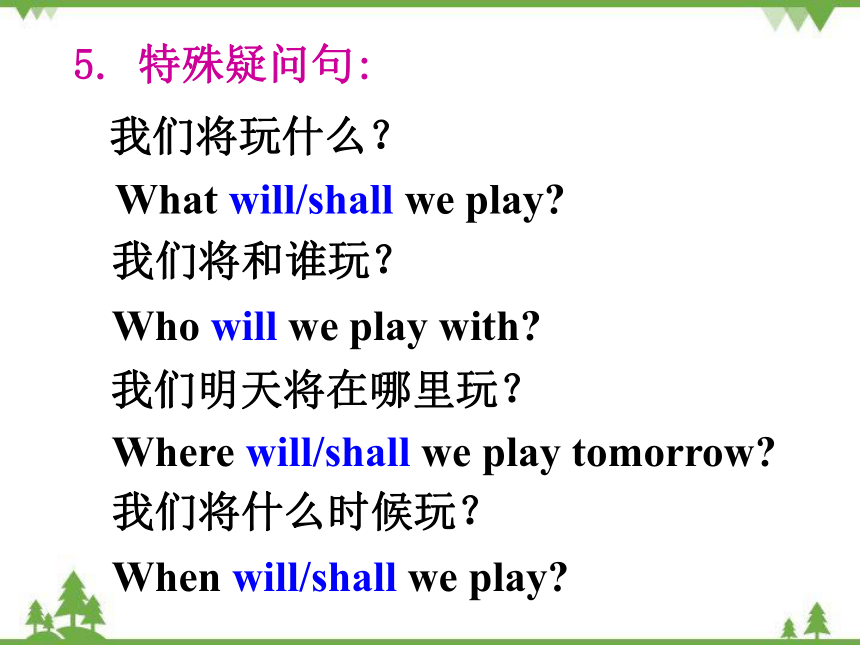
文档简介
(共38张PPT)
Where does Simon live
What do you think of the community centre in his neighbourhood
Do you think Simon is lucky to live in such a neighbourhood Why
1. Mr Green’s computer doesn’t work well. How can he get help from the community centre
How can they get help from the community centre
He’s going to ask a computer engineer to check his computer.
2. Lily’s bicycle is broken.
3. Little Tom has problems with his homework.
4. Grandma Chen is sick these days.
She’s going to ask someone to fix it.
Some college students will help him.
Some people will visit her and do some shopping for her.
What are they doing
What will they do
Look at these pictures
and answer the questions.
What’s the family doing
What will they do
What is the old woman doing
What will she do
We use simple future tense to talk about things that ____ _______.
will
happen
一般将来时的含义:
表示将要发生的事情。
一般将来时各种句式:
1. 肯定句:
will/shall + v.原形
The boy will play football tomorrow.
I shall cook supper next Monday.
2. 否定句:
will/shall + not + v.原形
won’t/shan’t + v.原形
The boy will not /won’t play football tomorrow.
缩写
I shall not /shan’t cook supper next Monday.
3. 一般疑问句:
将will/shall置于句首。
Will the boy play football tomorrow
Shall I cook supper next Monday
4. 一般疑问句回答:
肯定: Yes, 人称代词 + will/shall.
否定: No, 人称代词 + won’t/shan’t.
Yes, I shall.
Yes, he will.
No, I shan’t.
Yes, he won’t.
5. 特殊疑问句:
What will/shall we play
Who will we play with
我们将玩什么?
我们将和谁玩?
我们明天将在哪里玩?
Where will/shall we play tomorrow
我们将什么时候玩?
When will/shall we play
Simon’s computer is broken. He is asking someone at the community centre for plete their conversation with the simple future tense of the verbs in brackets.
Mr Lin: Hello, Simon. Do you need any help
Simon: Yes, Mr Lin. There’s something wrong with my computer.
Mr Lin: OK. We ____________ (ask) an engineer to check it for you.
Simon: When ____ the engineer ___ (be) free
shall/will ask
will
be
Mr Lin: Well, we _______ (call) him first. _____ you _____ (wait) for us to call back
Simon: All right. I _____________ (wait) for your call, Thanks.
Mr Lin: You’re welcome.
will call
Will
wait
will/shall wait
1. Amy will do her homework tonight.
(否定句)
(一般疑问句)
(肯定、否定回答)
(对划线部分提问)
Amy won’t do her homework tonight.
Will Amy do her homework tonight
Yes, she will.
No, she won’t.
What will Amy do tonight
I. 句型转换:
2. The flat will belong to Tom next year.
(否定句)
(一般疑问句)
(否定回答)
(对划线部分提问)
The flat won’t belong to Tom next year.
Will the flat belong to Tom next year
No, it will not/won’t.
Who will the flat belong to next year
3. I shall eat noodles this evening.
(1)
(2)
4. My mother will carry all the food.
(1)
(2)
What shall I eat this evening
When shall I eat noodles
What will my mother carry
Who will carry all the food
II. 用正确的时态填空。
1. The twin brothers _______ (go) fishing next Tuesday.
2. We _____________ (meet) outside the school gate tomorrow.
3. — How ____ they ____ (visit) the History Museum next week
— By bus.
will go
will/shall meet
will visit
4. He tried three times, he _________ (finish) this hard work in the end.
5. Look! The sun _________ (shine) in through the window.
6. _____ we ____ (take) different routes
7. Madee _____ (live) in a small town in Thailand. It __ (be) beautiful and quiet there, but it _____ (rain) a lot.
will finish
is shining
Shall take
lives
is
rains
8. He ________ (sit) on the balcony and _______ (look) out at the park at present.
9. — When ____ you ______ (arrive) in Beijing
— Two hours later.
10. — How long _____ it ____ (take) you to get there by the train
— Two hours and a half.
is sitting
looking
will arrive
does take
We use ‘be going to’ to talk about fixed plans for a certain time in the near future.
be going to 结构的含义:
1. 表示计划、打算或在不远的将来要做某事。
We use ‘be going to’ to talk about things that will probably happen.
2. 表示将可能发生的事。
be going to各种句式:
1. 肯定句:
be going to + v.原形
2. 否定句:
be + not + going to + v.原形
The boy is going to play football tomorrow.
The boy is not /isn’t going to play football tomorrow.
3. 一般疑问句:
将be置于句首。
Is the boy going to play football tomorrow
4. 一般疑问句回答:
肯定: Yes, 人称代词 + be.
Yes, he is.
否定: No, 人称代词 + be + not.
No, he isn’t.
5. 特殊疑问句:
(1) 疑问词 + be + 主语 + going to + v.原形
Where is he going
他打算去哪里?
Who is going to play football
你打算去哪里踢足球?
(2) 疑问词 + is + going to + v.原形 + 其他
你打算什么时候去踢足球?
谁打算去踢足球?
When are you going to play football
Where are you going to play football
将来时的典型标志:
next Tuesday / week / month …
Tomorrow (morning/afternoon …)
this afternoon … /Sunday …
tonight
the coming Sunday …
the day after tomorrow
soon
in the future
今夜
不久
(在)将来
后天
in + 一段时间
……后
即将到来的星期天…
Simon is telling Amy about his plan for a day out with his uncle’s family. Help him use the correct forms of be going to to talk about his plan.
Simon: Hi, Amy. My parents and I are planning a day out with my uncle’s family the day after tomorrow.
Amy: Great! What ____ you ___________ (do)
Simon: I ______________ (buy) some food, and my cousin Annie _______________ some plates and forks.
Amy: What ____ your parents __________ (do)
are
going to do
am going to buy
is going to buy
going to do
are
Simon: They _________________ (bring) some water.
Amy: How about your uncle
Simon: He ______________ (make) a fire.
Amy: And your aunt What ____ she ________ do
Simon: She ______________ (cook) some food.
are going to bring
is going to make
is
going to
is going to cook
We _______________ (meet) outside the school gate tomorrow.
2. How ____ they ___________ (visit) the History Museum next week
3. Look! The sun _________ (shine) in through the window.
4. He _________ (sit) on the balcony and _______ (look) out at the park at present.
shall/will meet
are going to meet
will
visit
are
going to visit
is shining
is sitting
looking
5. We are going to have an exam next week.(改为否定句并提问)
6. Tom will see a film this evening.
(提问)
We aren’t going to have an exam next week.
What are we going to have next week
What will Tom see this evening
7. Madee is studying Chinese now.
(用 next year 改写)
8. 两天后学校里将有一场排球比赛。
Madee will/is going to study Chinese next year.
There will/is going to be a volleyball match at school in two days.
有些动词,如:come, go, leave 等,其现在进行时可表示将来时。
eg. (1) We are leaving on Sunday.
(2) Lisa is coming back from New York tomorrow.
(3) Is your father going to the USA soon
1. 一直往前走,你会发现你的左边有一个饭店。
2. 我明天到上海。 (否定句,一般疑问句,肯定/否定回答)
3. 明天我将去公园。(否定句,一般疑问句,肯定/否定回答)
翻译下面句子并根据要求转换句型。
4. 今天晚上我去购物。 (否定句,一般疑问句,肯定/否定回答)
5. 下个月他就16岁。 (否定句,一般疑问句,肯定/否定回答)
6. 明天有雨。 (否定句,一般疑问句,肯定/否定回答)
7. 我打算买一辆小汽车。 (否定句,一般疑问句,肯定/否定回答)
8. 这个星期天你去游泳吗?
9. 你长大以后打算干什么
Where does Simon live
What do you think of the community centre in his neighbourhood
Do you think Simon is lucky to live in such a neighbourhood Why
1. Mr Green’s computer doesn’t work well. How can he get help from the community centre
How can they get help from the community centre
He’s going to ask a computer engineer to check his computer.
2. Lily’s bicycle is broken.
3. Little Tom has problems with his homework.
4. Grandma Chen is sick these days.
She’s going to ask someone to fix it.
Some college students will help him.
Some people will visit her and do some shopping for her.
What are they doing
What will they do
Look at these pictures
and answer the questions.
What’s the family doing
What will they do
What is the old woman doing
What will she do
We use simple future tense to talk about things that ____ _______.
will
happen
一般将来时的含义:
表示将要发生的事情。
一般将来时各种句式:
1. 肯定句:
will/shall + v.原形
The boy will play football tomorrow.
I shall cook supper next Monday.
2. 否定句:
will/shall + not + v.原形
won’t/shan’t + v.原形
The boy will not /won’t play football tomorrow.
缩写
I shall not /shan’t cook supper next Monday.
3. 一般疑问句:
将will/shall置于句首。
Will the boy play football tomorrow
Shall I cook supper next Monday
4. 一般疑问句回答:
肯定: Yes, 人称代词 + will/shall.
否定: No, 人称代词 + won’t/shan’t.
Yes, I shall.
Yes, he will.
No, I shan’t.
Yes, he won’t.
5. 特殊疑问句:
What will/shall we play
Who will we play with
我们将玩什么?
我们将和谁玩?
我们明天将在哪里玩?
Where will/shall we play tomorrow
我们将什么时候玩?
When will/shall we play
Simon’s computer is broken. He is asking someone at the community centre for plete their conversation with the simple future tense of the verbs in brackets.
Mr Lin: Hello, Simon. Do you need any help
Simon: Yes, Mr Lin. There’s something wrong with my computer.
Mr Lin: OK. We ____________ (ask) an engineer to check it for you.
Simon: When ____ the engineer ___ (be) free
shall/will ask
will
be
Mr Lin: Well, we _______ (call) him first. _____ you _____ (wait) for us to call back
Simon: All right. I _____________ (wait) for your call, Thanks.
Mr Lin: You’re welcome.
will call
Will
wait
will/shall wait
1. Amy will do her homework tonight.
(否定句)
(一般疑问句)
(肯定、否定回答)
(对划线部分提问)
Amy won’t do her homework tonight.
Will Amy do her homework tonight
Yes, she will.
No, she won’t.
What will Amy do tonight
I. 句型转换:
2. The flat will belong to Tom next year.
(否定句)
(一般疑问句)
(否定回答)
(对划线部分提问)
The flat won’t belong to Tom next year.
Will the flat belong to Tom next year
No, it will not/won’t.
Who will the flat belong to next year
3. I shall eat noodles this evening.
(1)
(2)
4. My mother will carry all the food.
(1)
(2)
What shall I eat this evening
When shall I eat noodles
What will my mother carry
Who will carry all the food
II. 用正确的时态填空。
1. The twin brothers _______ (go) fishing next Tuesday.
2. We _____________ (meet) outside the school gate tomorrow.
3. — How ____ they ____ (visit) the History Museum next week
— By bus.
will go
will/shall meet
will visit
4. He tried three times, he _________ (finish) this hard work in the end.
5. Look! The sun _________ (shine) in through the window.
6. _____ we ____ (take) different routes
7. Madee _____ (live) in a small town in Thailand. It __ (be) beautiful and quiet there, but it _____ (rain) a lot.
will finish
is shining
Shall take
lives
is
rains
8. He ________ (sit) on the balcony and _______ (look) out at the park at present.
9. — When ____ you ______ (arrive) in Beijing
— Two hours later.
10. — How long _____ it ____ (take) you to get there by the train
— Two hours and a half.
is sitting
looking
will arrive
does take
We use ‘be going to’ to talk about fixed plans for a certain time in the near future.
be going to 结构的含义:
1. 表示计划、打算或在不远的将来要做某事。
We use ‘be going to’ to talk about things that will probably happen.
2. 表示将可能发生的事。
be going to各种句式:
1. 肯定句:
be going to + v.原形
2. 否定句:
be + not + going to + v.原形
The boy is going to play football tomorrow.
The boy is not /isn’t going to play football tomorrow.
3. 一般疑问句:
将be置于句首。
Is the boy going to play football tomorrow
4. 一般疑问句回答:
肯定: Yes, 人称代词 + be.
Yes, he is.
否定: No, 人称代词 + be + not.
No, he isn’t.
5. 特殊疑问句:
(1) 疑问词 + be + 主语 + going to + v.原形
Where is he going
他打算去哪里?
Who is going to play football
你打算去哪里踢足球?
(2) 疑问词 + is + going to + v.原形 + 其他
你打算什么时候去踢足球?
谁打算去踢足球?
When are you going to play football
Where are you going to play football
将来时的典型标志:
next Tuesday / week / month …
Tomorrow (morning/afternoon …)
this afternoon … /Sunday …
tonight
the coming Sunday …
the day after tomorrow
soon
in the future
今夜
不久
(在)将来
后天
in + 一段时间
……后
即将到来的星期天…
Simon is telling Amy about his plan for a day out with his uncle’s family. Help him use the correct forms of be going to to talk about his plan.
Simon: Hi, Amy. My parents and I are planning a day out with my uncle’s family the day after tomorrow.
Amy: Great! What ____ you ___________ (do)
Simon: I ______________ (buy) some food, and my cousin Annie _______________ some plates and forks.
Amy: What ____ your parents __________ (do)
are
going to do
am going to buy
is going to buy
going to do
are
Simon: They _________________ (bring) some water.
Amy: How about your uncle
Simon: He ______________ (make) a fire.
Amy: And your aunt What ____ she ________ do
Simon: She ______________ (cook) some food.
are going to bring
is going to make
is
going to
is going to cook
We _______________ (meet) outside the school gate tomorrow.
2. How ____ they ___________ (visit) the History Museum next week
3. Look! The sun _________ (shine) in through the window.
4. He _________ (sit) on the balcony and _______ (look) out at the park at present.
shall/will meet
are going to meet
will
visit
are
going to visit
is shining
is sitting
looking
5. We are going to have an exam next week.(改为否定句并提问)
6. Tom will see a film this evening.
(提问)
We aren’t going to have an exam next week.
What are we going to have next week
What will Tom see this evening
7. Madee is studying Chinese now.
(用 next year 改写)
8. 两天后学校里将有一场排球比赛。
Madee will/is going to study Chinese next year.
There will/is going to be a volleyball match at school in two days.
有些动词,如:come, go, leave 等,其现在进行时可表示将来时。
eg. (1) We are leaving on Sunday.
(2) Lisa is coming back from New York tomorrow.
(3) Is your father going to the USA soon
1. 一直往前走,你会发现你的左边有一个饭店。
2. 我明天到上海。 (否定句,一般疑问句,肯定/否定回答)
3. 明天我将去公园。(否定句,一般疑问句,肯定/否定回答)
翻译下面句子并根据要求转换句型。
4. 今天晚上我去购物。 (否定句,一般疑问句,肯定/否定回答)
5. 下个月他就16岁。 (否定句,一般疑问句,肯定/否定回答)
6. 明天有雨。 (否定句,一般疑问句,肯定/否定回答)
7. 我打算买一辆小汽车。 (否定句,一般疑问句,肯定/否定回答)
8. 这个星期天你去游泳吗?
9. 你长大以后打算干什么
